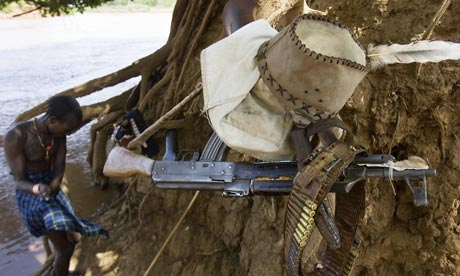December 8, 2012 (ADDIS ABABA) - The African Development
Bank (AfDB) has approved a loan agreement amounting
US$115 million to finance the construction of a
cross-border electricity highway running between
Ethiopia and Kenya.

A member of the Karo tribe by the Omo river in Ethiopia.
Three hydropower dams are planned - there are
fears that the resulting scarcity could lead to
violent conflict (Getty)
According to a press release issued by AfDB on
Friday, the loan agreements were signed in Nairobi
by Gabriel
Negatu, AfDB’s East Africa regional director,
and Kenya’s finance minister, Robinson Githae.
The US$1.26 billion Ethiopia-Kenya power line project
is a 1,068km high-voltage transmission line with
a power transfer capacity of up to 2,000MW.
Upon completion, the project will promote power,
economic trading and regional integration further
contributing to the Eastern Africa Power Pool (EAPP)
countries’ social and economic development,
and thereby playing tremendous roles in alleviating
poverty across countries of the region.
“
This project will facilitate export of surplus
power from Ethiopia to Kenya and therefore increase
power supply in the country,” Githae said.
According to AfDB, the project will position Ethiopia
as the main powerhouse and Kenya as the main hub
for power trade in the East African region.
The project which is co-funded by the World Bank;
the French Development Agency; and by the governments
of Ethiopia and Kenya will ultimately connect
power grids of five East African countries, namely
Kenya, Rwanda, Uganda, Burundi and the Democratic
Republic of Congo.
Last September AfDB approved a second phase US$348
million to fund to the project.
Ethiopia is currently investing billions of dollars
in building hydro-power dams as part of its ambitious
plan to be a leading regional power exporter.
Ethiopia is currently exporting hydropower processed
electricity to Djibouti and Sudan. It will soon
start exports to Kenya when the construction of
power transmission inter-connector pipeline is
complete.
South Sudan has also signed a memorandum of understanding
with the Ethiopian government to a build transmission
line that will enable it to import Ethiopia’s
electricity.
According to state utility, Ethiopia Electric
and Power Corporation (EEPCo), Ethiopia has plans
to invest over US$12 billion to increase its power
generating capacity to 10,000MW in 2015 from the
current 2,000MW and to further boost it to more
than 40,000MW of hydropower by 2035, which will
then make the country Africa’s largest power
exporter.
There are fears that the scarcity of water which could result from the damming will result in conflict.
The UK’s secretary of state for energy and climate change, Ed Davey, told a conference in March that "countries have not tended to go to war over water, but I have a fear for the world that climate instability drives political instability [...] The pressure of that makes conflict more likely."


